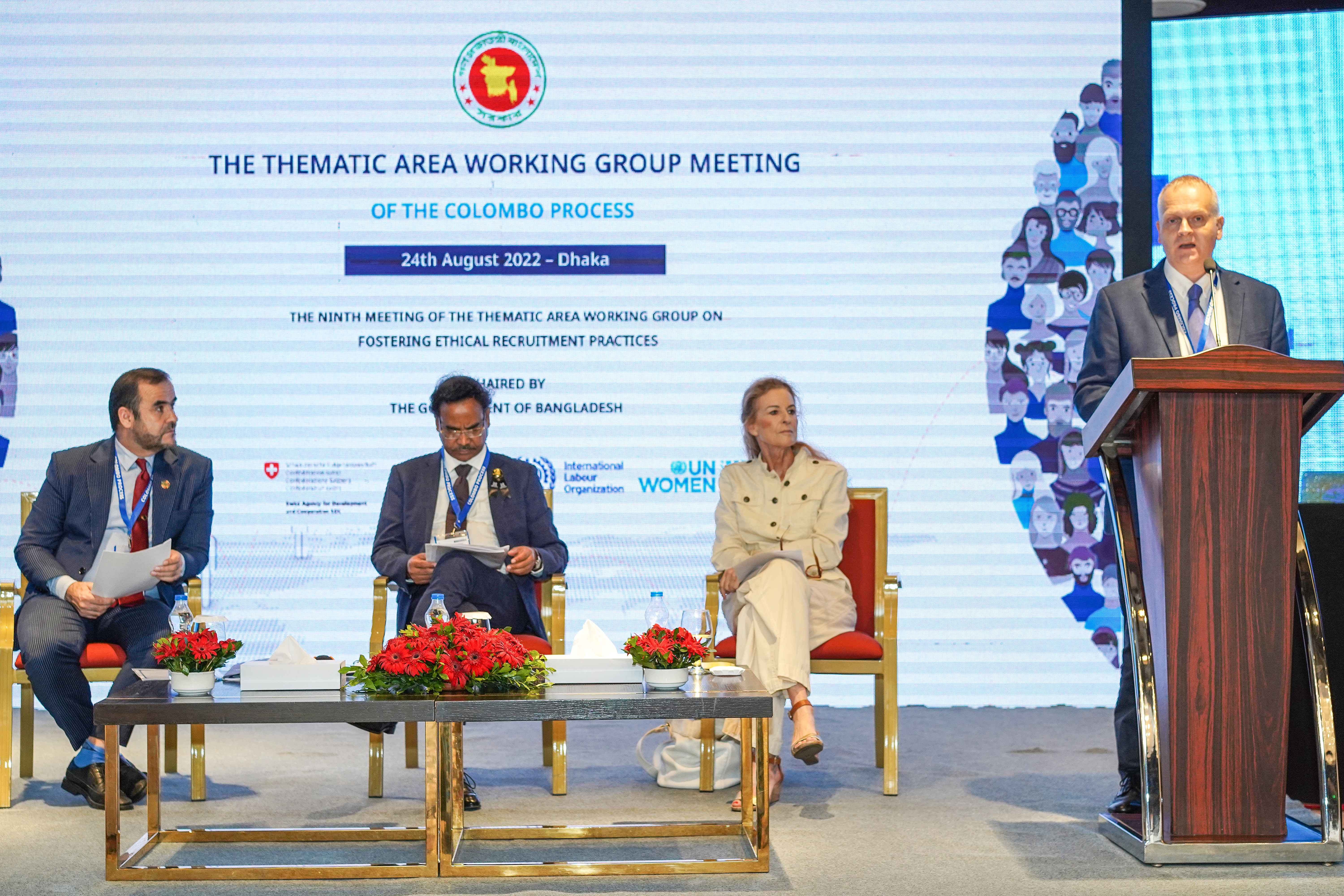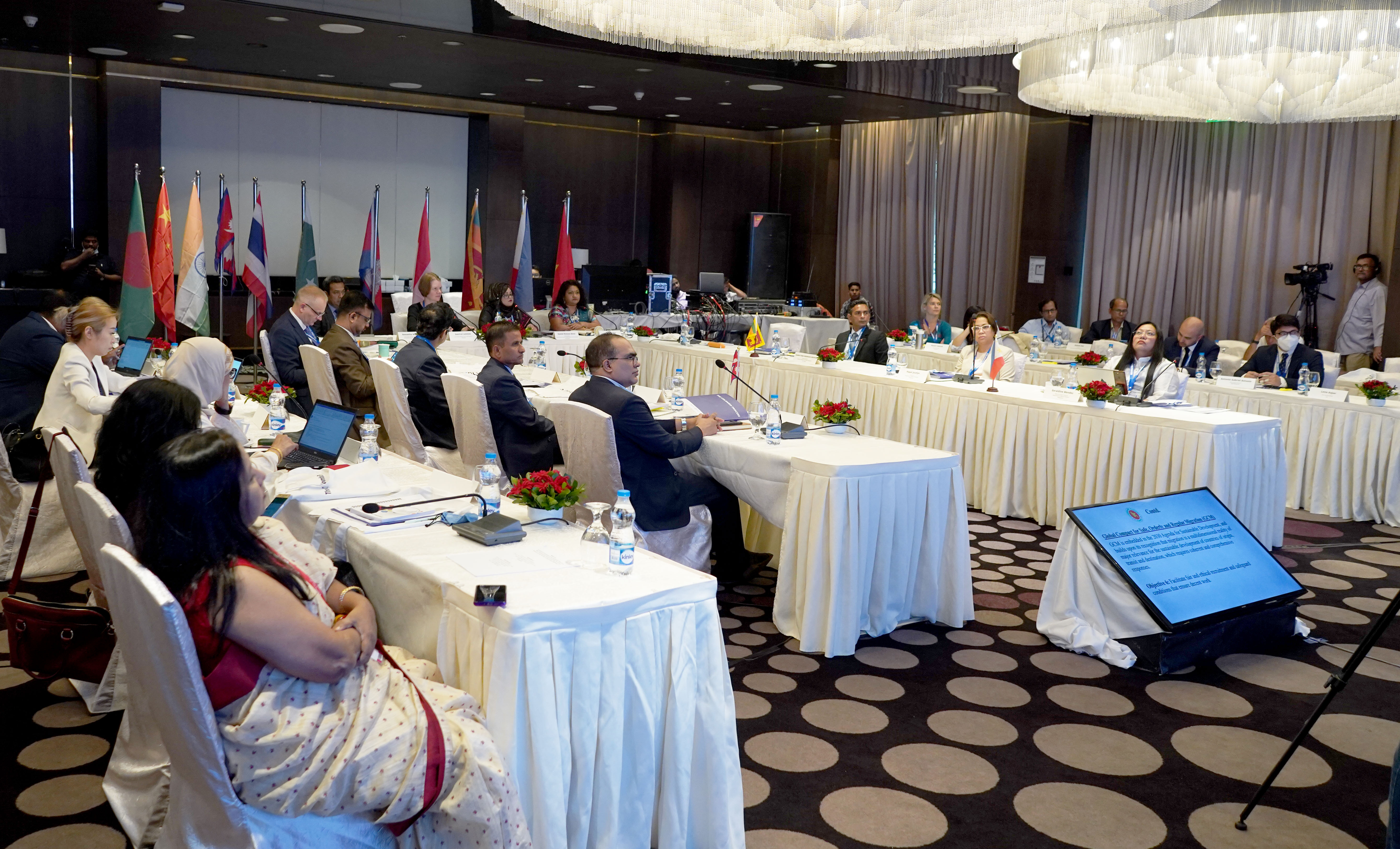-
Who We Are
WHO WE AREIOM is the leading inter-governmental organization promoting humane and orderly migration for the benefit of all, with presence in over 100 countries. IOM has had a presence in Bangladesh since 1998.
About
About
IOM Global
IOM Global
-
Our Work
Our WorkAs the leading inter-governmental organization promoting humane and orderly migration, IOM plays a key role to support the achievement of the 2030 Agenda through different areas of intervention that connect both humanitarian assistance and sustainable development. IOM's objective in Bangladesh is to promote migration that protects and benefits migrants and their societies.
Cross-cutting (Global)
Cross-cutting (Global)
- Data and Resources
- Take Action
- 2030 Agenda
Ethical Recruitment is Key to Ensure Safe, Orderly, and Regular Migration
Dhaka– The Colombo Process’s (CP) Thematic Area Working Group (TAWG) on Fostering Ethical Recruitment Practices concluded a two-day meeting in Dhaka today (25/08), emphasizing the need to collaborate on the promotion of fair and ethical recruitment to help ensure decent work and safe migration across South and Southeast Asia.
Representatives from CP Member States, including Bangladesh, Nepal, Philippines, Sri Lanka, Thailand, and Vietnam met in a hybrid meeting to discuss the need for harmonization of policies and regulations to address the vulnerabilities of migrant workers.
The meeting was chaired by the Government of Bangladesh with the support of the Colombo Process Technical Support Unit (CPTSU), and IOM Bangladesh.
According to the World Migration Report 2022, the number of international migrants has grown from 84 million globally in 1970 to 281 million in 2020, representing 3.6 per cent of the world’s population. Migrants contribute with their knowledge, networks, and skills to build stronger, more resilient communities in sending and destination countries.

Colombo Process (CP) is a regional consultative process of 12 Asian countries that focuses on the protection of and provision of services to migrant workers and optimizing the benefits of organized labour migration for both sending and receiving countries for both migrants and their families. This is increasingly relevant in the region as Governments recognize that migration issues cannot be addressed unilaterally.
The Colombo Process addresses the five thematic priority areas of: Skills and Qualification Recognition Processes, Fostering Ethical Recruitment Practices, Pre-departure Orientation and Empowerment, Promoting Cheaper, Faster and Safer Transfer of Remittances and Labor Market Analysis.
During the 9th meeting of the TAWG, Member States finalized their four-year work plan to further the goals of transforming the recruitment industry from the employee-pay model to an employer-pay model; ensuring informal recruitment actors are encompassed under the regulatory framework; and equipping migrant workers with the information necessary for decent work and safe migration.
Joining the inaugural session, Dr Ahmed Munirus Saleheen, Secretary, Ministry of Expatriates’ Welfare and Overseas Employment, Government of Bangladesh, said, "Migrant workers remain particularly vulnerable to exploitation, which often starts at recruitment. Cooperation among different stakeholders at both sending and receiving ends is required to ensure ethical recruitment practices in migration.” He added that “The Colombo Process provides a regional platform to consult on issues faced by overseas workers, as well as by labour sending and receiving states."
Speaking at the TAWG inaugural session, Abdusattor Esoev, IOM Bangladesh’s Chief of Mission, remarked, "Migrants are often subject to unethical recruitment practices. Ensuring fair and ethical recruitment is a precondition to ensuring safe, orderly, and regular migration. We now have global tools and initiatives that will help us to foster ethical recruitment. All parties should join hands for the wellbeing of migrants."
The meeting and the work of the TAWGs are supported by Governance of Labour Migration in South and Southeast Asia (GOALS) Programme, a joint UN programme implemented by the International Organization for Migration (IOM), the International Labour Organization (ILO) and UN Women, with financial assistance from the Swiss Agency for Development and Cooperation (SDC).

Suzanne Mueller, Chargée d’Affaires a.i., Embassy of Switzerland in Bangladesh, said, "Ethical recruitment goes a long way to addressing irregular migration and exploitation of migrants. This requires the combined efforts of sending and destination countries. SDC will continue to work closely with Governments, international partners, and local stakeholders on promoting ethical recruitment.”
The meeting also included presentations from; Geertrui Lanneau, IOM’s Senior Regional Labour Mobility and Social Inclusion Specialist, on the International Recruiting Integrating System (IRIS), IOM’s flagship initiative which promotes ethical recruitment of migrant workers and serves as a reference point for labour recruiters, employers and state actors on how to integrate ethical recruitment principles into recruitment-related management systems, policies, regulations, processes and procedures; Maria Gallotti, ILO’s Migration Policy Specialist, briefed participants on ILO’s fair recruitment initiative, and Nansiri Iamsuk, Programme Specialist of UN Women, who provided an overview of the Gender-Responsive Self-Assessment Tool for Recruitment Agencies.
For more information please contact:
In Dhaka, Md Sariful Islam, mdsislam@iom.int, +8809195631608
In Colombo, Andrew Gray, ajgray@iom.int, +94774400269
In Bangkok, Itayi Viriri, iviriri@iom.int, +66 65 939 0934
